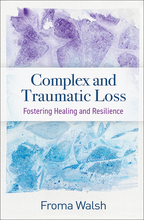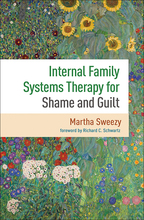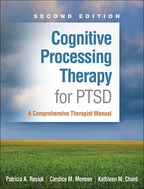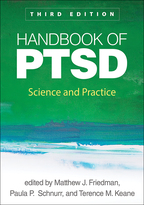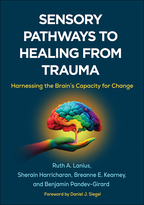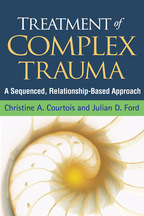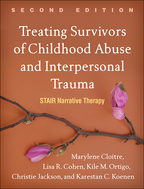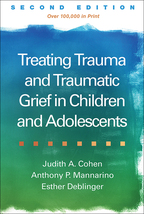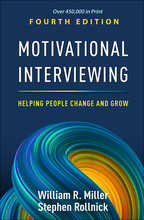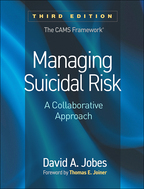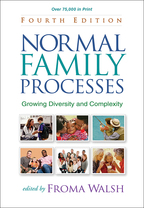Complex and Traumatic Loss
Fostering Healing and Resilience
Froma Walsh
HardcoverPaperbacke-bookprint + e-book
Hardcover
orderJuly 17, 2023
ISBN 9781462552559
Price: $74.00 272 Pages
Size: 6" x 9"
Paperback
orderJuly 11, 2023
ISBN 9781462553020
Price: $49.00272 Pages
Size: 6" x 9"
e-book
orderJune 28, 2023
PDF and Accessible ePub ?
Price: $49.00 272 Pages
ePub is Global Certified Accessible
print + e-book $98.00 $58.80
orderPaperback + e-Book (PDF and Accessible ePub) ?
Price: 272 Pages
ePub is Global Certified Accessible
Sign up for emails on upcoming titles on Trauma & PTSD (with special discounts)!
“This book is well-written and a pleasure to read despite the heavy content. Within each chapter, the material is clearly organized. The text is accessible and comprehensible, with every complicated idea broken down manageably….Complex and Traumatic Loss: Fostering Healing and Resilience is a useful source of insight for professionals and advanced students who may clinically encounter those experiencing challenges surrounding death of all kinds. Notwithstanding the existing collection of grief books for clinicians, the current book anchors on resilience, providing a specific layer of understanding to bring into counseling spaces. One can expect after reading this book, they may better understand grief and can help clients forge a way forward ….Essential for all who wish to sensitively treat people dealing with loss.”

—Journal of Contemporary Psychotherapy
“This book should be on the shelves of any mental health clinician and a required textbook in any graduate program as grief is a universal experience that touches us in profound ways. The author is an accomplished, nationally and internationally recognized scholar on loss and grief and resilience in family systems….In her characteristic brilliant way, the author has gifted us with another excellent book on grief and loss, at a time when we need it most, when viruses and wars leave tears and sadness in their paths. Her work helps clinicians to better understand grief processes and their impact on the individual, couples, families, or larger systems. Written with professional authority and personal compassion, the theoretical concepts come to life through case examples from years of experience in helping people live lovingly beyond loss….This work is a needed addition to the professional literature on grief.”

—Doody's Review Service
“With clinical acumen and insight, Walsh explores the deeply personal, intricately social process of grieving life-altering loss and reexamining one’s life narrative in its wake. Moving beyond the common preoccupation with stages and symptoms of grief, Walsh provides a far subtler view of the significance of loss for family systems. She seamlessly weaves theory and practice to conceptualize and promote resilience in the face of often traumatic life transitions. The result is a treasure trove of clear clinical guidelines, satisfyingly nuanced and complex case studies, and coherent synthesis of research and practice wisdom. This book is the magnum opus of one of our field’s most fertile, sophisticated, and visionary minds. I recommend it enthusiastically to any practitioner with a passion for accompanying grieving families with clarity and creativity as they find new meaning in a changed world.”

—Robert A. Neimeyer, PhD, Director, Portland Institute for Loss and Transition
“This book is a triumph. Walsh is a wise guide for clinicians working with individuals, couples, and families suffering from the death of loved ones. Based on the latest research, and weighing in on current debates, the book draws on decades of clinical practice related to loss and bereavement. Walsh clearly demonstrates how a resilience-oriented systemic approach can help people 'bounce' forward in their lives, even in the face of complicated and traumatic losses. While covering an enormous scope of tragic circumstances, the book is nonetheless hopeful. Walsh’s conviction that resilience is possible gleams on every page. The book is a gem; it will be a go-to resource for years to come.”

—Kaethe Weingarten, PhD, Director, The Witness to Witness Program, Migrant Clinicians Network
“It seems strange to call a book uplifting when the topic is loss and excruciating grief—but this stunning book shines new possibilities of hope and healing on the heaviness of suffering. In this brilliant, beautifully crafted, and sensitive work, Walsh empowers the reader with crucial concepts and essential practice applications. Universals of grief are attended to, but so are the nuances of sociocultural locations of race, class, religion, or migration. This indispensable resource will be invaluable for courses and clinical training. Professionals will return to it again and again for guidance in helping others, and to cope with their own natural avoidance in attending to unbearable losses.”

—Celia J. Falicov, PhD, Department of Family Medicine, University of California, San Diego
“Walsh brings a lifetime of clinical wisdom and scholarship to this profound discussion of loss, its vicissitudes, and its relation to treatment. She holds both a keen awareness of the effects of traumatic loss and a strong belief in the healing power of relational resilience. The book provides a clear understanding of varieties of loss and how to work with each of them in therapy. It is wonderfully written, moving seamlessly between conceptual information, clinical vignettes, and poignant personal stories. Anchored in a systemic view, the book transcends schools of psychotherapy to speak to how to be therapeutic in the presence of loss—and, ultimately, to the heart of being human. Add this to your list of top ten books about the practice of psychotherapy. It should be a core text in every psychotherapy graduate program.”

—Jay L. Lebow, PhD, ABPP, Clinical Professor and Senior Therapist, The Family Institute at Northwestern University
“Walsh writes pointedly about the need to see grief as a varied and complex adaptation to loss, rather than as a binary of normal versus disordered. She focuses on applying therapy based on human resilience and growth. This book will enlighten students as well as veteran therapists who may not be aware of the many recent updates in this field.”

—Pauline Boss, PhD, author of Ambiguous Loss
—Journal of Contemporary Psychotherapy
“This book should be on the shelves of any mental health clinician and a required textbook in any graduate program as grief is a universal experience that touches us in profound ways. The author is an accomplished, nationally and internationally recognized scholar on loss and grief and resilience in family systems….In her characteristic brilliant way, the author has gifted us with another excellent book on grief and loss, at a time when we need it most, when viruses and wars leave tears and sadness in their paths. Her work helps clinicians to better understand grief processes and their impact on the individual, couples, families, or larger systems. Written with professional authority and personal compassion, the theoretical concepts come to life through case examples from years of experience in helping people live lovingly beyond loss….This work is a needed addition to the professional literature on grief.”
—Doody's Review Service
“With clinical acumen and insight, Walsh explores the deeply personal, intricately social process of grieving life-altering loss and reexamining one’s life narrative in its wake. Moving beyond the common preoccupation with stages and symptoms of grief, Walsh provides a far subtler view of the significance of loss for family systems. She seamlessly weaves theory and practice to conceptualize and promote resilience in the face of often traumatic life transitions. The result is a treasure trove of clear clinical guidelines, satisfyingly nuanced and complex case studies, and coherent synthesis of research and practice wisdom. This book is the magnum opus of one of our field’s most fertile, sophisticated, and visionary minds. I recommend it enthusiastically to any practitioner with a passion for accompanying grieving families with clarity and creativity as they find new meaning in a changed world.”
—Robert A. Neimeyer, PhD, Director, Portland Institute for Loss and Transition
“This book is a triumph. Walsh is a wise guide for clinicians working with individuals, couples, and families suffering from the death of loved ones. Based on the latest research, and weighing in on current debates, the book draws on decades of clinical practice related to loss and bereavement. Walsh clearly demonstrates how a resilience-oriented systemic approach can help people 'bounce' forward in their lives, even in the face of complicated and traumatic losses. While covering an enormous scope of tragic circumstances, the book is nonetheless hopeful. Walsh’s conviction that resilience is possible gleams on every page. The book is a gem; it will be a go-to resource for years to come.”
—Kaethe Weingarten, PhD, Director, The Witness to Witness Program, Migrant Clinicians Network
“It seems strange to call a book uplifting when the topic is loss and excruciating grief—but this stunning book shines new possibilities of hope and healing on the heaviness of suffering. In this brilliant, beautifully crafted, and sensitive work, Walsh empowers the reader with crucial concepts and essential practice applications. Universals of grief are attended to, but so are the nuances of sociocultural locations of race, class, religion, or migration. This indispensable resource will be invaluable for courses and clinical training. Professionals will return to it again and again for guidance in helping others, and to cope with their own natural avoidance in attending to unbearable losses.”
—Celia J. Falicov, PhD, Department of Family Medicine, University of California, San Diego
“Walsh brings a lifetime of clinical wisdom and scholarship to this profound discussion of loss, its vicissitudes, and its relation to treatment. She holds both a keen awareness of the effects of traumatic loss and a strong belief in the healing power of relational resilience. The book provides a clear understanding of varieties of loss and how to work with each of them in therapy. It is wonderfully written, moving seamlessly between conceptual information, clinical vignettes, and poignant personal stories. Anchored in a systemic view, the book transcends schools of psychotherapy to speak to how to be therapeutic in the presence of loss—and, ultimately, to the heart of being human. Add this to your list of top ten books about the practice of psychotherapy. It should be a core text in every psychotherapy graduate program.”
—Jay L. Lebow, PhD, ABPP, Clinical Professor and Senior Therapist, The Family Institute at Northwestern University
“Walsh writes pointedly about the need to see grief as a varied and complex adaptation to loss, rather than as a binary of normal versus disordered. She focuses on applying therapy based on human resilience and growth. This book will enlighten students as well as veteran therapists who may not be aware of the many recent updates in this field.”
—Pauline Boss, PhD, author of Ambiguous Loss

